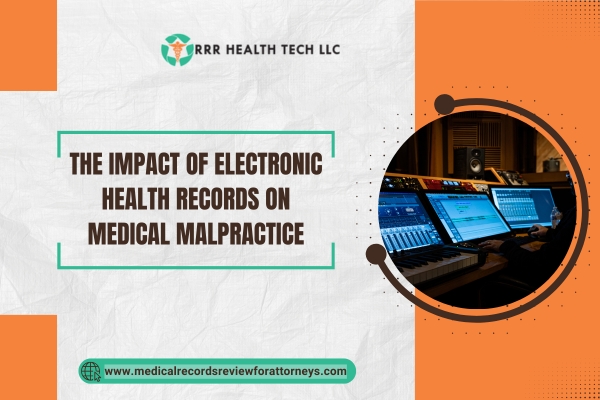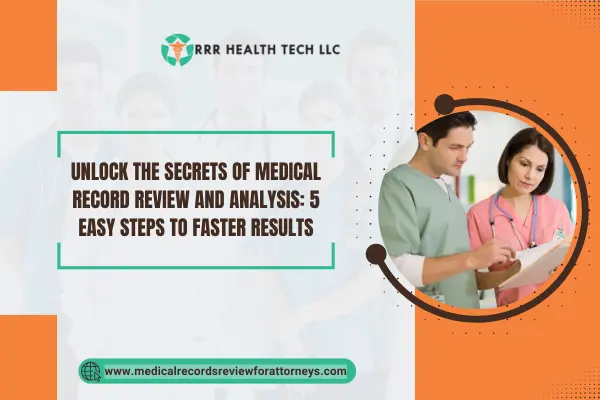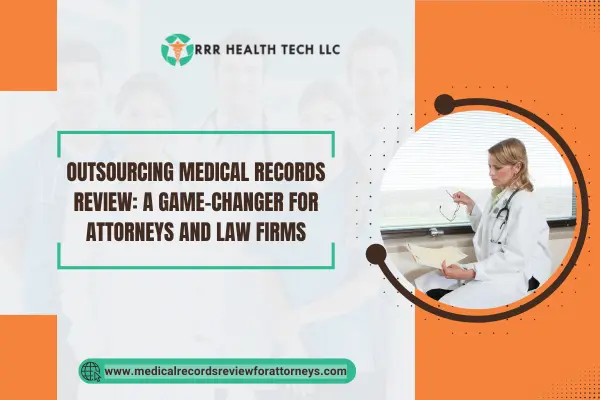
Bringing EHRs into the healthcare cluster has transformed how patients are managed and information is made accessible. Unfortunately, this advancement has also brought new issues such as the problem of EHRs in relation to medical malpractice. As a review of medical records for attorneys practice, it is crucial to note how EHR-related occurrences affect malpractice lawsuits and how we can help attorneys cope with these problems.
Understanding Electronic Health Records (EHRs)
What Are Electronic Health Records?
Electronic Health Records are digital versions of patients’ paper charts. They contain comprehensive information about a patient’s medical history, including:
• Demographics: Basic details such as the patient’s age, gender, and the like.
• Medical history: Details of other illnesses, surgeries done, and treatments.
• Medications: Prescriptions given before and currently.
• Lab Results: Results of tests done and imaging done.
• Treatment Plans: Current and previously on-going treatments.
Benefits of EHRs
EHRs offer numerous advantages, including:
• Accessibility: Patient records can be accessed from multiple locations which enhance coordinated care.
• Improved Communication: Information between health care providers is shared in EHR thus minimizing Omni errors.
• Data Insights: Healthcare providers utilize patient information for better results through analytics made possible with EHR.
The Intersection of EHRs and Medical Malpractice
Common EHR-Related Malpractice Issues
Despite their benefits, EHRs can contribute to medical malpractice claims in several ways:
• Misdiagnosis and Mistreatment: Errors with data entry can cause inputting the wrong information about a patient which can lead to a misdiagnosis or mistreatment.
• Improper Usage of Systems: Ill trained employee’s accounts for poor EHR system usage and hence negative health outcomes.
• Downtime: System outages and other technology problems can put access to needed patient information out of reach.
Statistics on EHR-Related Malpractice Claims
Recent studies indicate a growing trend in EHR-related malpractice claims:
• As set forth in the report from the American Medical Association, 30% of malpractice lawsuits are related to the use of an EHR system.
• A cumulative study of numerous plaintiff cases viewed in 2019 suggest that EHR’s account the monthly 15% of all medical malpractice claims as per the data published in Journal of Patient Safety.
Legal Implications of EHR-Related Malpractice
Establishing Liability
To establish liability in EHR-related malpractice cases, the following elements must be proven:
- Care: There was a considerate effort taken by a healthcare provider towards the patient.
- Breach of Duty: The obligations that were set were not followed due to issues with the EHR systems.
- Causation: It caused harm to the patient.
- Damages: The patient was demonstrably harmed because of this.
Potential Liable Parties
Liability in EHR-related malpractice cases can extend to various parties, including:
• Healthcare Providers: Medical doctors, nurses, and other para-medical personnel.
• Healthcare Institutions: Hospitals and clinics that use EHR systems.
• EHR Vendors: Companies that design and provide technical support for the EHR systems.
How Medical Records Review Can Assist Attorneys
Importance of Medical Records Review
As a medical records review company, we play a crucial role in assisting attorneys with EHR-related malpractice cases. Our services include:
• Thorough Analysis: We help our clients prove that malpractice occurred by reviewing medical records and identifying discrepancies, errors, and omissions.
• Expert Testimony: We are able to provide a medical expert opinion regarding any allegations of negligence through EHR.
• Case Preparation: We assist in case preparation for the attorneys by maintaining and summarizing the medical records for easy access when presenting evidence in court.
Case Studies
Case Study 1: Data Entry Error Leading to Misdiagnosis
Overview: A patient exhibited signs of a heart condition. The physician attending to the patient relied on the information available on the EHR, which was incorrectly populated, and concluded that the patient had anxiety.
Challenges: The patient had heart attack weeks after that, causing many other health problems.
Solutions: The patient filed a malpractice suit against the health care provider claiming that the wrong data entry caused him to be diagnosed inappropriately.
Compensation: The patient was compensated and awarded in this case for medical care, wages that could not be earned, and for physical and mental distress.
Case Study 2: System Failure Resulting in Delayed Treatment
Overview: An unfortunate patient with excruciating abdominal pain went to a hospital, but because of a system failure on the EHR, the physician was unable to retrieve the patient’s records, which subsequently wasted a lot of time before the actual treatment could take place.
Challenges: Such delays made the patient go through severe complications which essential necessitated an emergency operation.
Solutions: The patient decided to sue the hospital on the grounds that they were negligent and did not provide appropriate care because the EHR system did not function.
Compensation: In this case, the patient was compensated for the excessive medical expenses incurred, the income they could not earn, and for the psychological consequences.
Conclusion
While the implementation of Electronic Health Records (EHR) has undoubtedly advanced healthcare services, it has also created new vulnerabilities that could result in malpractice cases. We, as a medical records review company, specialize in assisting lawyers cope with the changing environment by providing comprehensive analyses and consulting services. For legal practitioners and patients alike, the impacts associated with EHR need to be understood fully in order to ensure responsibility and protection of patient safety.


